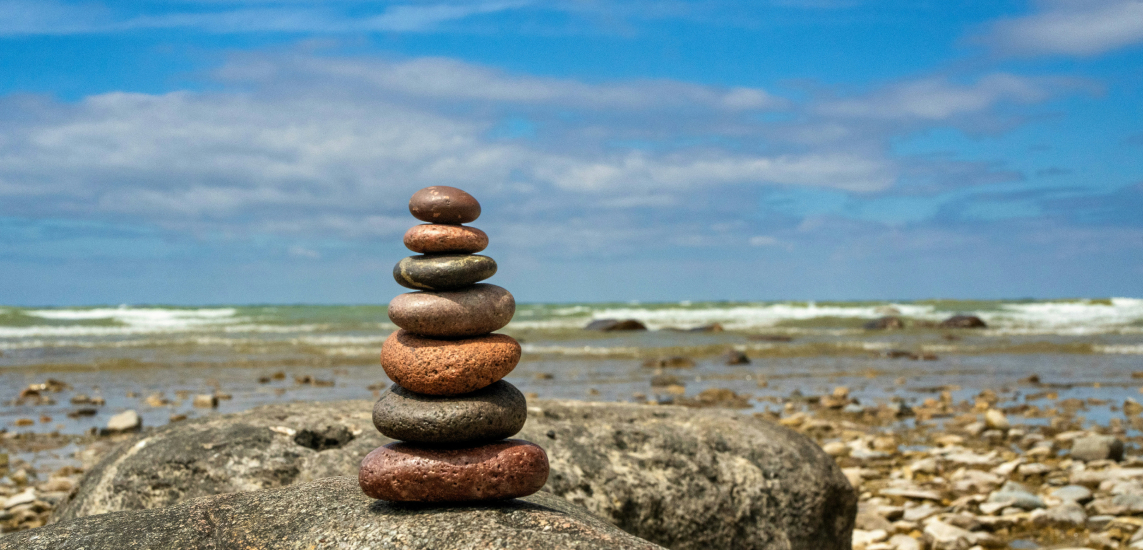Habit change expert Hugh Byrne explains how habitual behavior forms and mindfulness is a key of breaking bad habits. (This is a transcription of day one of his 10-day Insight course.)
Why Breaking Bad Habits Can Be Difficult
Habits form a very important part of our lives. Research has shown that almost half of what we do is habitual.
45 % of everyday behaviors are repeated in the same location every day.
Some of our habits are healthy and beneficial or useful — putting on a seatbelt when we get in a car, brushing and flossing our teeth, or the brain’s way of remembering how to swim or ride a bike even if we haven’t done it for years.
But we can also get stuck in unhealthy habits when we do something to achieve a goal or get a feeling. Once the behavior gets established it causes us harm, for example, eating excessive sweets, drinking unconsciously, or repeating self-judging or anxious thought loops.
Habits are the brain’s way of conserving energy and resources.
How Habits Form
When we do the same thing often enough in a consistent way — same time, same place, same people or feelings — the brain assigns that behavior to a faster moving system of brain functioning.
Daniel Kahneman, the psychologist who won a Nobel Prize for economics and wrote ‘Thinking Fast and Slow’, calls this fast-acting brain process ‘System One’. It’s habitual, automatic, instinctual, and connected to our survival fight-or-flight response. It’s connected to the more ancient part of our brain.
What he calls ‘System Two’ are the slower, rational, logical, and intentional processes associated with the more recent part of our brain, the uniquely human pre-frontal cortex.
Though, the behavior initially is carried out to get a reward, a dopamine boost to the brain, for example, from eating a big bowl of ice cream when we’re feeling low or from seeing many of our friends ‘like’ our Facebook post.
After a while, if the behavior is repeated often enough, it becomes automatic even though it was initially started to get a benefit. It then is triggered by environmental cues rather than by our present intentions. Every time we feel a pang of boredom or anxiety, for example, we check our email or social media or have a cookie or some ice cream.
Mindfulness As A Key To Habit Change
Because of the faster acting instinctual brain processes, habits can be very hard to change even when we want to change them.
But we can change habits, even strong and well-established ones. A key to habit change is bringing conscious awareness, or mindfulness, to the behavior.
Mindfulness is meeting our experience with acceptance and without judgment. It’s being present with whatever we’re feeling, seeing, hearing, tasting, touching, thinking. Mindfulness is essential to changing unwanted habits and to developing new healthier ones.
Mindfulness is a key to habit change because it brings awareness to behaviors and activities that have become automatic and unconscious.
With mindfulness, we’re making what is invisible and unconscious, what is underneath the radar, visible and conscious. When we bring mindfulness to a habit, it opens up the possibility of making a choice, and we can choose not to carry out an unhealthy behavior or to substitute a more healthy activity.
Discover more than 3.5k free guided mindfulness meditation practices that help to bring awareness to the present while observing emotions, thoughts, and feelings openly, compassionately and non-judgementally.
Take smoking. Without mindfulness, if you have a smoking habit, you’ll reach for and light a cigarette when a particular and familiar urge or stimulus comes up. With conscious awareness, with mindfulness, you can bring awareness to the urge and the accompanying feelings, and choose to stay with them rather than lighting up.
Also read about how to let go of anger through mindfulness.
Breaking Bad Habits Is A Choice
It’s not easy to change habits because habits develop strong pathways in the brain, neuro pathways. We need to develop the skills to be willing to stay with and experience difficult feelings, and learn that we don’t have to believe all the messages, the urges, the cravings, the reactions that our minds repeat.
We can see that we have a choice, and in having a choice we can make a more healthy, rather than a less healthy choice.
There’s a wide scope of breaking bad habits. Expert Hugh Byrne has published helpful guided meditations on Insight Timer that help to change bad habits:
- Working With Challenging Emotions Hugh Byrne 15:05
- Bringing Mindfulness To Habits Of Stress And Anxiety Hugh Byrne 13:17
- Bringing Mindfulness To Habits Of Distraction Hugh Byrne 8:11
- Bringing Mindfulness To Habits Of Wanting And Craving Hugh Byrne 10:58
- Bringing Mindfulness To Habits Of Resistance And Aversion Hugh Byrne 10:16
Habit change is a process. Work with Hugh Byrne on breaking your personal bad habits and do his 10-day Insight course “How To Change Unwanted Habits”. In this course you’ll develop skills to work with a range of different habits — skills that can help you live with greater well-being and freedom. This article is a transcription of the first session.







